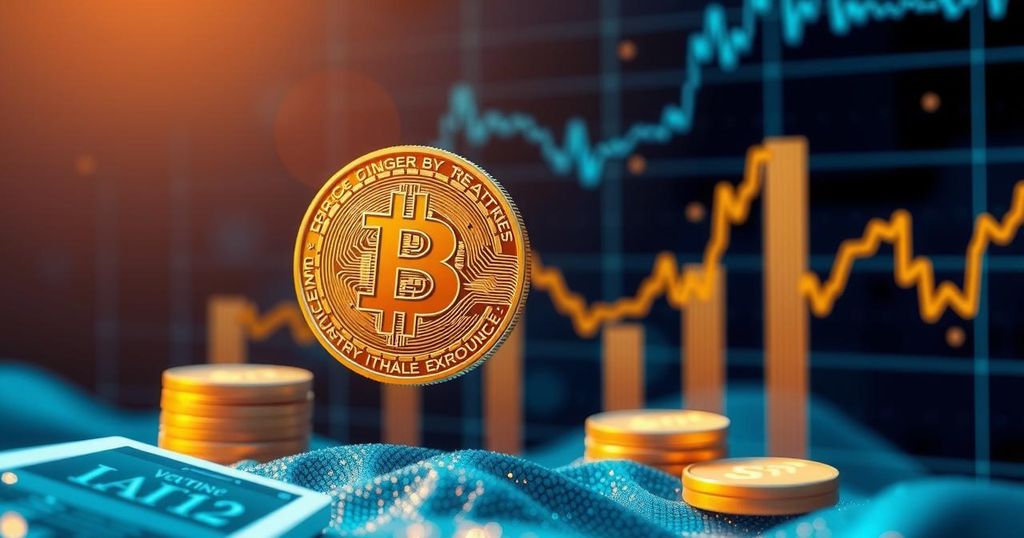Bitcoin and the Brazilian Real: Seizing Contrarian Opportunities in Tariff-Driven Volatility
With the U.S.-Brazil tariff skirmish prompting significant market moves, investors have a rare chance to pivot towards Bitcoin while the Brazilian real slides.
Tariff Tensions Drive Currency Instability and Opportunity
The ongoing tariff skirmish between the U.S. and Brazil has significantly impacted the Brazilian real (BRL), with volatility soaring and the currency in freefall. The U.S. recently slapped a hefty 50% tariff on Brazilian exports, citing political grievances against former President Jair Bolsonaro, leading to the BRL’s sharp decline to R$5.48 against the dollar. This scenario has resulted in a spike in implied volatility in the iShares MSCI Brazil ETF (EWZ), reaching an alarming 25%. In contrast, Bitcoin (BTC) has found its footing, climbing to nearly $35,000 as market instability prevails, presenting what many view as a prime opportunity for contrarian investment.
The Real Faces Pressure From Multiple Fronts
The downward trend of the Brazilian real can be traced back to the U.S. tariff decisions that came into force on August 1, 2025. These tariffs particularly affect crucial Brazilian exports such as oil, coffee, and iron ore, which combined represent a staggering 40% of the nation’s export revenue. With the U.S. leisurely enjoying a $6.8 billion trade surplus over Brazil, President Trump’s justification for these tariffs—linking them to political harassment against Bolsonaro—highlights the political motivations at play. Consequently, this has created a turbulent cycle: as investors withdraw from the real, inflation spurs from capital outflows, putting increasing pressure on Brazil’s central bank to raise interest rates, consequently crunching down on economic growth.
Retaliation Strategies Might Worsen Economic Crisis
With trading tensions continuing, Brazil’s responses—including the suspension of specific trade agreements—are likely to exacerbate the crisis. There’s even talk from financial institutions like Goldman Sachs that failure to address these tariffs could see the real plummeting further to R$6 per dollar, which would significantly inflate Brazil’s public debt servicing costs. Moreover, on the home front, the currency is burdened by issues like fiscal gridlock regarding tax reforms, not to mention a central bank that remains locked at a 15% Selic rate, all of which amplify the currency’s existing vulnerabilities.
Bitcoin Emerges As a Safe Investment Choice
On the flip side, while the real deteriorates, Bitcoin seems to be thriving despite regulatory complications. The cryptocurrency’s recent rally to $35,000 highlights its position as a potential safe-haven asset amidst this turmoil. Unlike traditional currencies, Bitcoin’s fixed supply of 21 million makes it relatively immune to inflation’s harsh sting, making it an attractive alternative as Brazil anticipates a 5.3% inflation rate in 2025. Furthermore, Bitcoin’s independence from national policies provides it with a resilience that the real simply can’t match, adeptly positioning it as a reliable store of value amid this politically charged atmosphere.
Strategies for Investors Looking to Profit
So, how can investors benefit from this situation? The compelling data illustrates that there exists a strong connection between the crumbling real and the surging Bitcoin. Investors looking to capitalise should consider shorting the Brazilian real—options include using inverse ETFs like ProShares UltraShort Brazilian Real (BZQ) or trading USD/BRL futures. Additionally, allocating funds toward Bitcoin, whether directly or through funds like the Grayscale Bitcoin Trust (GBTC), can enhance one’s exposure to Bitcoin’s inflation-resistant characteristics. Also, employing volatility instruments, like selling downside puts on Bitcoin or purchasing protective calls, can help guard against short-term market swings.
Navigating Investments Amid Uncertainty
However, it’s crucial to remember that no investment scenario is devoid of risks. A sudden thaw in tariff relations or a shift in U.S. trade policy could stabilise the real and hinder the potential upswing in Bitcoin’s value. Moreover, uncertainties surrounding Bitcoin’s regulatory landscape still loom overhead. That said, the current conditions—marked by geopolitical uncertainty, escalating inflation, and rampant capital flight—notably favour Bitcoin as a contrarian investment opportunity.
A Clear Path Forward for Investors
The ongoing tariff conflict between the U.S. and Brazil serves as more than just a fleeting trade dispute; it reveals the delicate nature of our global economy. For investors, cavorting in Bitcoin, which appears resilient in the face of the real’s vulnerabilities, presents a clear strategy: focus on Bitcoin as an escape from associated currency risks while minimizing exposure to struggling currencies like the real. Immediate action seems prudent, especially with the likelihood of another volatility surge on the horizon. All things considered, Bitcoin stands out—not merely as an investment, but rather as a defensive strategy against the unpredictability of government actions and the struggle of fiat currencies.
In summary, the ongoing tariff tension between the U.S. and Brazil is reshaping the investment landscape. Bitcoin’s robust performance amid the real’s troubles presents a seemingly straightforward opportunity for those willing to take a contrarian stance on the current volatile market. By focusing on Bitcoin as a hedge and avoiding the unpredictability of weakened currencies, investors could find themselves well-positioned for the tumultuous future ahead.




Post Comment